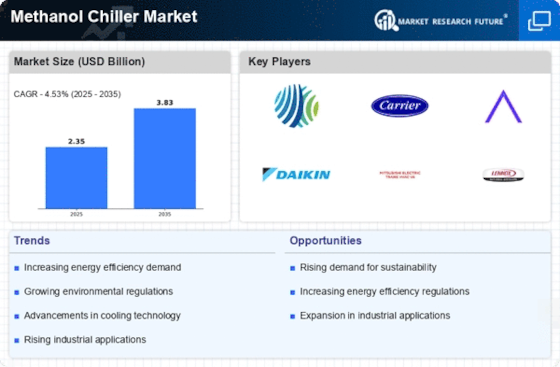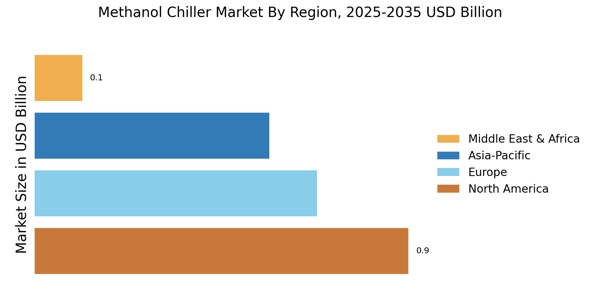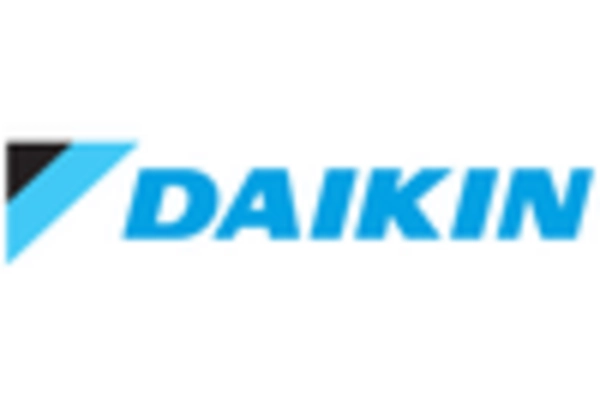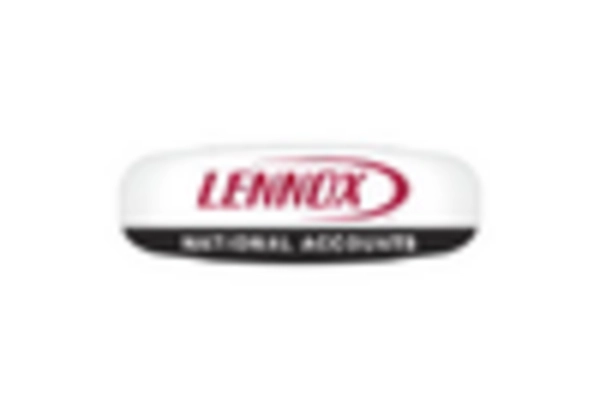Supportive Regulatory Frameworks
The Methanol Chiller Market benefits from a supportive regulatory environment that encourages the adoption of cleaner technologies. Governments are increasingly implementing regulations aimed at reducing greenhouse gas emissions and promoting energy efficiency. For instance, policies that incentivize the use of low-emission cooling technologies are likely to enhance the attractiveness of methanol chillers. Additionally, international agreements focused on climate change mitigation are pushing industries to transition towards more sustainable practices. This regulatory support not only fosters innovation within the Methanol Chiller Market but also creates a favorable landscape for manufacturers and end-users to invest in methanol-based cooling solutions.
Increasing Industrial Applications
The Methanol Chiller Market is witnessing a surge in applications across diverse industrial sectors. Industries such as food and beverage, pharmaceuticals, and chemical processing are increasingly adopting methanol chillers for their cooling needs. The versatility of methanol chillers allows them to be utilized in various processes, including temperature control during production and storage. For instance, the food and beverage sector, which is projected to grow at a CAGR of 5.5%, is particularly reliant on efficient cooling systems to maintain product quality and safety. This expanding range of applications is expected to bolster the demand for methanol chillers, thereby enhancing the overall growth trajectory of the Methanol Chiller Market.
Rising Demand for Energy Efficiency
The Methanol Chiller Market is experiencing a notable increase in demand for energy-efficient cooling solutions. As industries seek to reduce operational costs and minimize environmental impact, methanol chillers, known for their lower energy consumption compared to traditional systems, are gaining traction. Reports indicate that energy-efficient technologies can reduce energy use by up to 30%, making them an attractive option for various sectors, including manufacturing and commercial refrigeration. This trend is further supported by the growing emphasis on sustainability, prompting companies to invest in advanced cooling technologies that align with their environmental goals. Consequently, the rising demand for energy efficiency is likely to drive the growth of the Methanol Chiller Market in the coming years.
Growing Awareness of Environmental Impact
There is a growing awareness regarding the environmental impact of traditional cooling systems, which is influencing the Methanol Chiller Market. As consumers and businesses become more conscious of their carbon footprints, there is a shift towards adopting more sustainable cooling solutions. Methanol chillers, which produce fewer emissions compared to conventional refrigerants, are increasingly viewed as a viable alternative. This shift is reflected in market trends, where the demand for eco-friendly products is on the rise. Companies that prioritize sustainability are likely to drive the adoption of methanol chillers, thereby contributing to the expansion of the Methanol Chiller Market in the foreseeable future.
Technological Innovations in Cooling Systems
Technological advancements are playing a pivotal role in shaping the Methanol Chiller Market. Innovations such as improved heat exchange technologies and enhanced control systems are making methanol chillers more efficient and user-friendly. These advancements not only optimize performance but also reduce maintenance costs, making them a more appealing choice for businesses. Furthermore, the integration of smart technologies, such as IoT-enabled monitoring systems, allows for real-time performance tracking and predictive maintenance, which can significantly enhance operational efficiency. As these technologies continue to evolve, they are likely to attract more investments into the Methanol Chiller Market, driving its growth and adoption across various sectors.

















